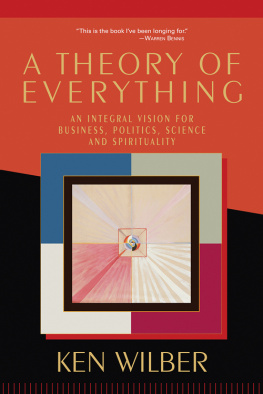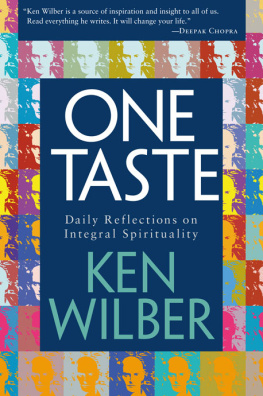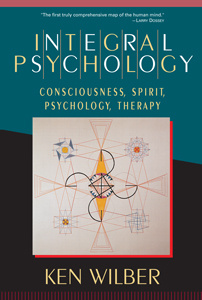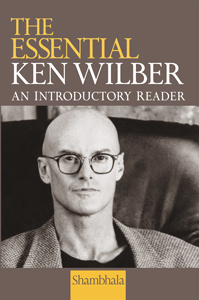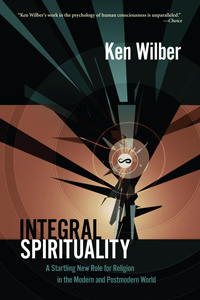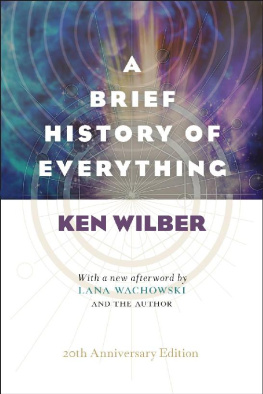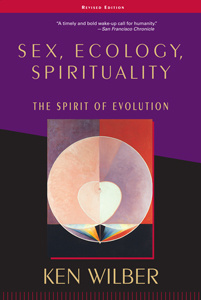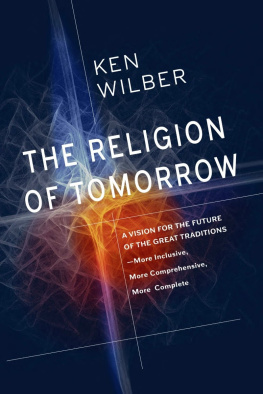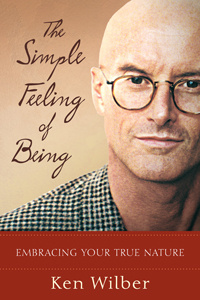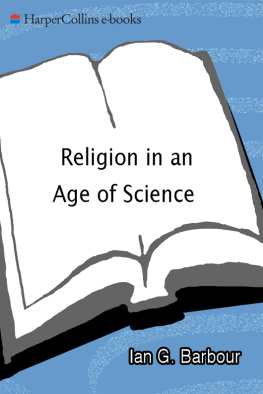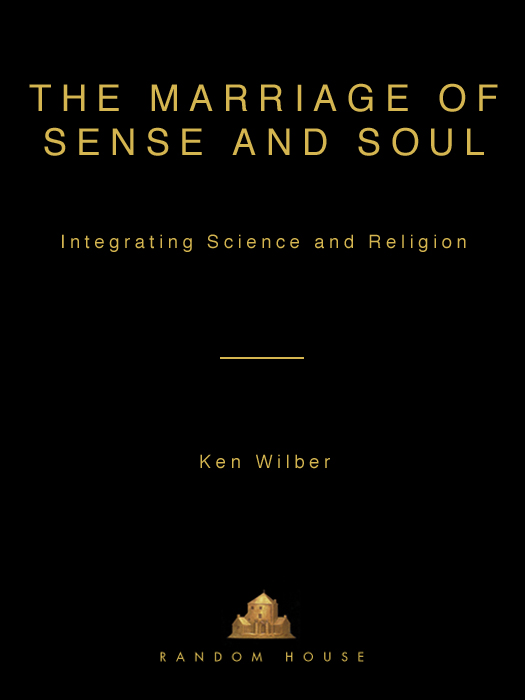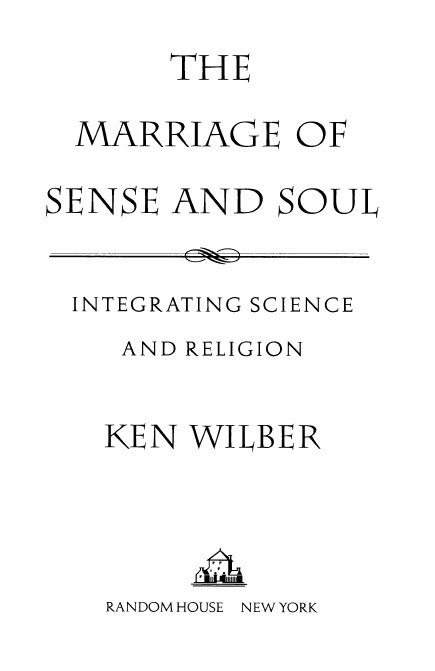ALSO BY KEN WILBER
THE SPECTRUM OF CONSCIOUSNESS
THE ATMAN PROJECT
NO BOUNDARY
UP FROM EDEN
A SOCIABLE GOD
QUANTUM QUESTIONS
EYE TO EYE
TRANSFORMATION OF CONSCIOUSNESS
(WITH JACK ENGLER AND DANIEL P. BROWN)
GRACE AND GRIT
SEX, ECOLOGY, SPIRITUALITY
A BRIEF HISTORY OF EVERYTHING
THE EYE OF SPIRIT
Copyright 1998 by Ken Wilber
All rights reserved under International and Pan-American Copyright Conventions. Published in the United States by Random House, Inc., New York, and simultaneously in Canada by Random House of Canada Limited, Toronto.
LIBRARY OF CONGRESS CATALOGING-IN-PUBLICATION DATA
Wilber, Ken.
The marriage of sense and soul: integrating science and religion /
Ken Wilber.
p. cm.
eISBN: 978-0-307-79956-2
1. Religion and science. I. Title.
BL240.2.W526 1998 215dc21 97-22787
Random House website address: http://www.randomhouse.com/
v3.1
CONTENTS

A NOTE TO THE READER

There is nothing that will cure the senses but the soul, and nothing that will cure the soul but the senses.
OSCAR WILDE
It is hard to say exactly when modern science began. Many scholars would date it at roughly 1600, when both Kepler and Galileo started using precision measurement to map the universe. But one thing is certain: starting from whatever date we choose, modern science was, in many important ways and right from the start, deeply antagonistic to established religion.
Most of the early scientists, of course, remained true believers, genuinely embracing the God of the Church; many of them sincerely believed that they were simply discovering Gods archetypal laws as revealed in the book of nature. And yet, with the introduction of the scientific method, a universal acid was released that would slowly, inevitably, painfully eat into and corrode the centuries-old steel of religion, dissolving, often beyond recognition, virtually all of its central tenets and dogmas. Within the span of a mere few centuries, intelligent men and women in all walks of life could deeply and profoundly do something that would have utterly astonished previous epochs: deny the very existence of Spirit.
Despite the entreaties of the tenderhearted in both camps, the relation of science and religion in the modern worldthat is, in the last three or four centurieshas changed very little since their introduction to each other in the trial of Galileo, where the scientist agreed to shut his mouth and the Church agreed not to burn him. Many wonderful exceptions aside, the plain historical fact has been that orthodox science and orthodox religion deeply distrust, and often despise, each other.
It has been a tense confrontation, a philosophical cold war of global reach. On the one hand, modern empirical science has made stunning and colossal discoveries: the cure of diseases such as typhoid, smallpox, and malaria, which racked the ancient world with untold anguish; the engineering of marvels from the airplane to the Eiffel Tower to the space shuttle; discoveries in the biological sciences that verge on the secrets of life itself; advances in computer sciences that are literally revolutionizing human existence; not to mention plopping a person on the moon. Science can accomplish such feats, its proponents maintain, because it utilizes a solid method for discovering truth, a method that is empirical and experimental and based on evidence, not one that relies on myths and dogmas and unverifiable proclamations. Thus science, its proponents believe, has made discoveries that have relieved more pain, saved more lives, and advanced knowledge incomparably more than any religion and its pie-in-the-sky God. Humanitys only real salvation is a reliance on scientific truth and its advance, not a projection of human potentials onto an illusory Great Other before whom we grovel and beg in the most childish and undignified of fashions.
There is a strange and curious thing about scientific truth. As its own proponents constantly explain, science is basically value-free. It tells us what is, not what should be or ought to be. An electron isnt good or bad, it just is; the cells nucleus is not good or bad, it just is; a solar system isnt good or bad, it just is. Consequently science, in elucidating or describing these basic facts about the universe, has virtually nothing to tell us about good and bad, wise and unwise, desirable and undesirable. Science might offer us truth, but how to use that truth wisely: on this science is, and always has been, utterly silent. And rightly so; that is not its job, that is not what it was designed to do, and we certainly should not blame science for this silence. Truth, not wisdom or value or worth, is the province of science.
In the midst of this silence, religion speaks. Humans seem condemned to meaning, condemned to find value, depth, care, concern, worth, significance to their everyday existence. If science will not (and cannot) provide it, most men and women will look elsewhere. For literally billions of people around the world, religion provides the basic meaning of their lives, the glue of their existence, and offers them a set of guidelines about what is good (e.g., love, care, compassion) and what is not (e.g., lying, cheating, stealing, killing). On the deepest level, religion has even claimed to offer a means of contacting or communing with an ultimate Ground of Being. But by any other name, religion offers what it believes is a genuine wisdom.
Fact and meaning, truth and wisdom, science and religion. It is a strange and grotesque coexistence, with value-free science and value-laden religion, deeply distrustful of each other, aggressively attempting to colonize the same small planet. It is a clash of Titans, to be sure, yet neither seems strong enough to prevail decisively nor graceful enough to bow out altogether. The trial of Galileo is repeated countless times, moment to moment, around the world, and it is tearing humanity, more or less, in half.
Fools rush in where angels fear to tread; therefore, the integration of science and religion is the theme of this book. If you are an orthodox religious believer, I would ask only that you relax into the argument and see where it takes you; I do not think you will be dismayed. My primary prerequisite in this discussion is that both science and religion must find the argument acceptable in their own terms. For this marriage to be genuine, it must have the free consent of both spouses.
If you are an orthodox scientist, I would only suggest that, as you have a thousand times in the past when you were working on a problem, let curiosity and wonder bubble up, but in this case dont focus it on a specific solution. Simply let wonder fill your being until it takes you out of yourself and into the staggering mystery that is the existence of the world, a mystery that facts alone can never begin to fill. If Spirit does exist, it will lie in that direction, the direction of wonder, a direction that intersects the very heart of science itself. And you will find, in this adventure, that the scientific method will never be left behind in the search for an ultimate ground.


